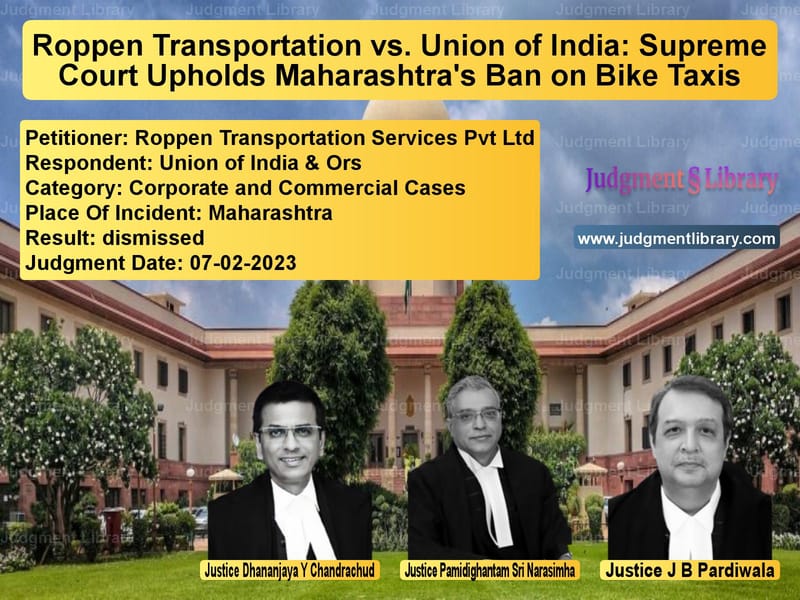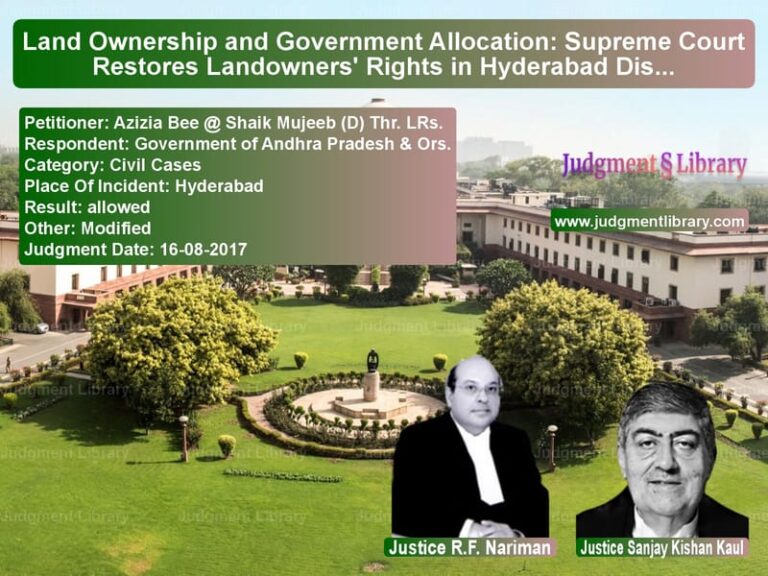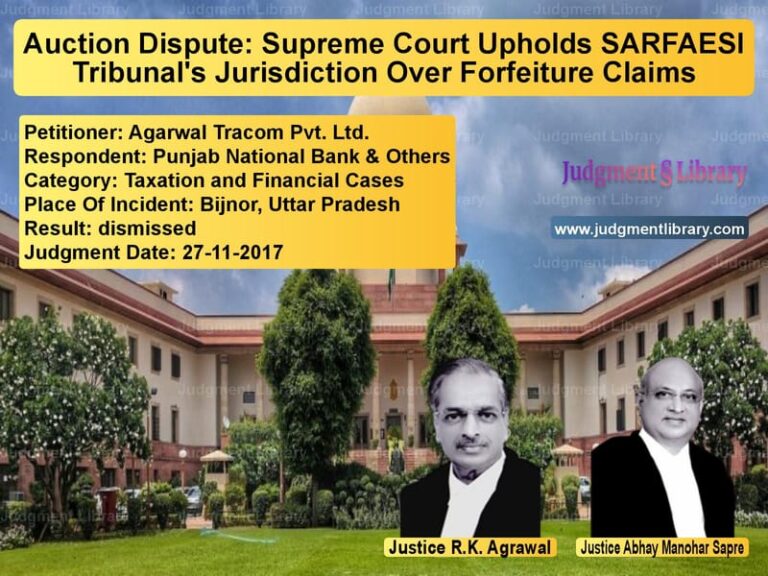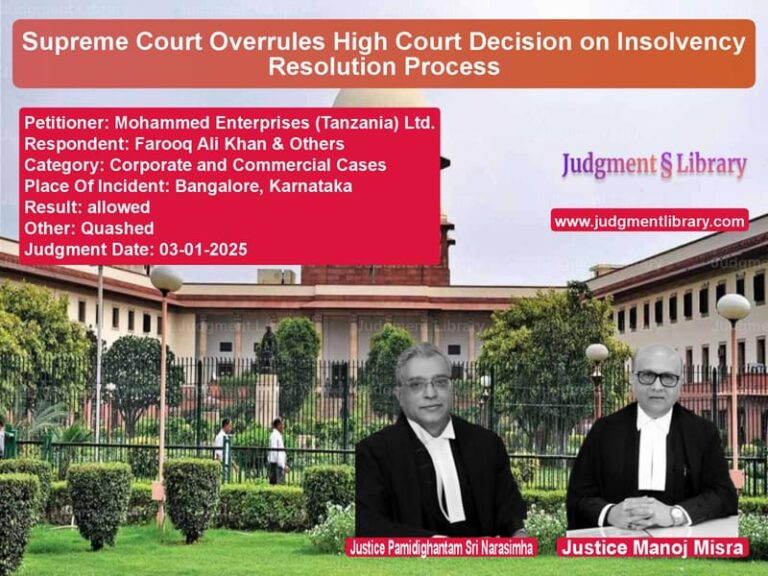Roppen Transportation vs. Union of India: Supreme Court Upholds Maharashtra’s Ban on Bike Taxis
The Supreme Court of India recently ruled on a case involving Roppen Transportation Services Pvt. Ltd., an app-based aggregator, which challenged Maharashtra’s decision to ban the use of non-transport vehicles for aggregation and ride-sharing services. The case revolved around the implementation of the Motor Vehicles Act, 1988, and whether Maharashtra’s government had the authority to prohibit bike taxis and similar services.
Background of the Case
Roppen Transportation Services, which operates under the popular ride-hailing brand Rapido, applied for a license to run bike taxi services in Maharashtra. However, the Regional Transport Officer (RTO) in Pune rejected their application on December 21, 2022, citing non-compliance with several provisions of the Motor Vehicles Aggregator Guidelines, 2020. Following this rejection, the Maharashtra government issued a notification on January 19, 2023, completely prohibiting the use of non-transport vehicles—including two-wheelers, three-wheelers, and four-wheelers—for aggregation and ride-sharing services.
Roppen Transportation challenged this decision in the Bombay High Court, which upheld the state government’s authority to regulate aggregators. The company then moved the Supreme Court, arguing that Maharashtra’s ban contradicted the guidelines set by the central government under the Motor Vehicles Act.
Petitioner’s Arguments (Roppen Transportation)
Senior advocate Mukul Rohatgi, representing Roppen Transportation, argued:
- The central government’s Motor Vehicle Aggregator Guidelines, 2020 allowed for non-transport vehicles to be used for ride-sharing, provided states did not explicitly prohibit them.
- Maharashtra’s decision to ban bike taxis was arbitrary and inconsistent with the national policy, which aims to reduce congestion and pollution through better vehicle utilization.
- The rejection of the license application by the RTO was based on a lack of a clear regulatory framework in Maharashtra, making the decision unfair to aggregators like Rapido.
- Since other states allowed bike taxis, Maharashtra’s ban put businesses like Rapido at an unfair disadvantage.
Respondent’s Arguments (State of Maharashtra & Union of India)
The Solicitor General of India, Tushar Mehta, along with representatives from the Maharashtra government, countered:
- The Motor Vehicle Aggregator Guidelines, 2020 were only advisory and did not bind state governments.
- The Maharashtra government had the authority under the Motor Vehicles Act, 1988 to regulate transport services and decide on the suitability of ride-sharing models.
- The state’s decision was based on safety concerns, as using non-transport vehicles (private vehicles) for commercial purposes posed a risk to passengers.
- Pending the decision of a government committee studying the impact of bike taxis, the ban was necessary to prevent unregulated operations.
Supreme Court’s Judgment
The Supreme Court, led by Chief Justice Dhananjaya Y. Chandrachud, dismissed the petition, affirming Maharashtra’s authority to regulate transport services within its jurisdiction. The key findings of the Court were:
- Under the Motor Vehicles Act, states have the power to regulate aggregators and transport vehicles, including setting licensing conditions.
- The central government’s guidelines were advisory and did not override the state’s regulatory authority.
- The Maharashtra government’s decision to prohibit non-transport vehicles for aggregation was based on safety concerns and was not arbitrary.
- The state had formed a committee to examine the feasibility of allowing non-transport vehicles for ride-sharing, and the Supreme Court deferred to the state’s discretion.
The Court concluded:
“The State Government has categorically taken a decision that the issue as to whether non-transport vehicles should be permitted to be used as transport vehicles, including for aggregation and ride pooling, merits detailed consideration.”
Final Verdict
The Supreme Court ruled:
- The challenge to the January 19, 2023, notification was dismissed.
- Roppen Transportation was directed to approach the Bombay High Court under Article 226 if it wished to challenge the state government’s notification further.
- The Maharashtra government was given until March 31, 2023, to finalize its policy on ride-sharing and bike taxis.
Implications of the Judgment
This ruling has significant implications for app-based aggregators and the transport industry:
- State Autonomy: It reinforces the principle that state governments have the authority to regulate transport services within their jurisdiction.
- Regulatory Uncertainty: Aggregators must navigate state-specific regulations, as the central government’s guidelines are not binding.
- Safety Considerations: The Court upheld Maharashtra’s concerns about the safety of using private two-wheelers for commercial transport.
- Future Policy Changes: Maharashtra’s decision to review its stance on bike taxis suggests that the policy may evolve based on recommendations from its committee.
This judgment sets a precedent for how ride-sharing services will be regulated in India, emphasizing state control over transport policies and safety regulations.
Petitioner Name: Roppen Transportation Services Pvt Ltd.Respondent Name: Union of India & Ors.Judgment By: Justice Dhananjaya Y Chandrachud, Justice Pamidighantam Sri Narasimha, Justice J B Pardiwala.Place Of Incident: Maharashtra.Judgment Date: 07-02-2023.
Don’t miss out on the full details! Download the complete judgment in PDF format below and gain valuable insights instantly!
Download Judgment: roppen-transportatio-vs-union-of-india-&-ors-supreme-court-of-india-judgment-dated-07-02-2023.pdf
Directly Download Judgment: Directly download this Judgment
See all petitions in Company Law
See all petitions in Corporate Compliance
See all petitions in unfair trade practices
See all petitions in Public Sector Employees
See all petitions in Bankruptcy and Insolvency
See all petitions in Judgment by Dhananjaya Y Chandrachud
See all petitions in Judgment by P.S. Narasimha
See all petitions in Judgment by J.B. Pardiwala
See all petitions in dismissed
See all petitions in supreme court of India judgments February 2023
See all petitions in 2023 judgments
See all posts in Corporate and Commercial Cases Category
See all allowed petitions in Corporate and Commercial Cases Category
See all Dismissed petitions in Corporate and Commercial Cases Category
See all partially allowed petitions in Corporate and Commercial Cases Category







